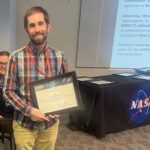ESSIC/CISESS Assistant Research Professor Thomas Wild recently earned an award with the National Science Foundation (NSF) for a proposal titled “INFEWS/T1: Decision-Driven Advances in Integrated Assessment Modeling of the Food-Energy-Water Nexus”. The award will provide $2.5M of funding for five years.
This research project will develop a new, integrated analytical approach that considers the interconnections among food, energy, and water systems to improve regional food-energy-water systems (FEWS) planning. The research ensures consistency of regional planning scenarios with national and global trends, while also considering institutional barriers to integrated planning. This project focuses on integrated FEWS planning in river basins in Argentina and Uruguay. These locations are ideal testbeds for developing this new approach due to their strong regional-to-global connectivity through agricultural trade, diversity in institutional structures, and mix of far-reaching policies, from Sustainable Development Goals (SDGs) to climate adaptation.
This project involves the following international collaborations: in Uruguay (Secretaría Nacional de Agua, Ambiente y Cambio Climático and Universidad de la República); in Argentina (Instituto Nacional del Agua, Comisión Regional del Río Bermejo, Autoridad Interjurisdiccional de las Cuencas de los riìos Limay, Neuqueìn y Negro); in Washington DC (Water and Sanitation Division of the Inter-American Development Bank).
Wild is the Principal Investigator of this project, supported by a research team that includes Leon Clarke (UMD School of Public Policy), Jonathan Lamontagne (Tufts University), Dave White (Arizona State University), Mohamad Hejazi (ESSIC and Pacific Northwest National Laboratory) and Fernando Miralles-Wilhelm (ESSIC and AOSC).
To learn more about the NSF award, click here: “INFEWS/T1: Decision-Driven Advances in Integrated Assessment Modeling of the Food-Energy-Water Nexus”.





